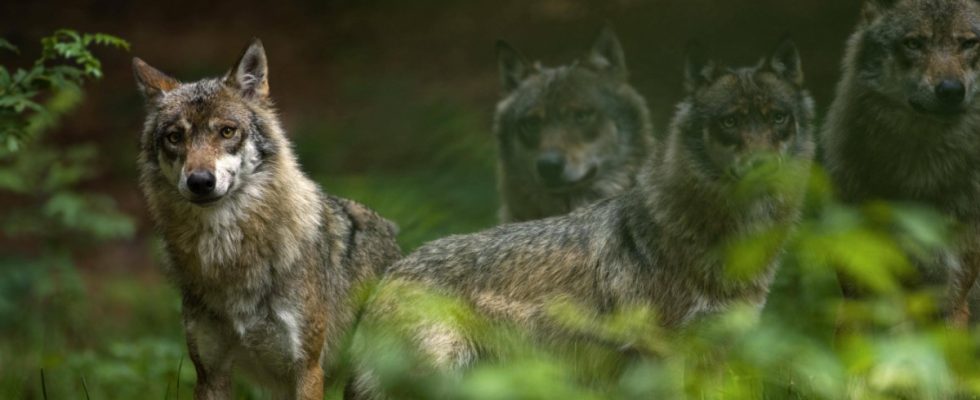The farmers in the Eichstätt district want to have the male wolf shot, which has repeatedly killed sheep and other farm animals in the region. At the end of August, they submitted a formal request for removal, as such a shooting is officially called, to the government of Upper Bavaria. The district government and the SZ farmers’ association have confirmed this. “After months of attacks by male wolves, the grazing livestock farmers here are in great fear,” says Johann Scharl, district chairman of the farmers’ association in the Eichstätt district. The Upper Bavarian farmers’ president Ralf Huber says: “The male dog is causing massive problems. We have to prevent them from getting even worse.”
The wolf pack in the Eichstätt district only became established this year. The female with the official name GW1613f comes from the pack in the Veldensteiner Forest and settled in the Altmühltal a good three years ago. Since then, the Altmühltal has been officially listed as a wolf region. The owners of sheep and other grazing animals were repeatedly asked to protect their flocks from attacks at night. The male dog was first detected almost a year ago. He goes by the name GW2977m and came from a pack in Bad Belzig, Brandenburg. The two have had seven puppies since early summer.
The female and the male were inconspicuous for a long time. But there have been attacks since the second half of July. The State Office for the Environment (LfU), which is responsible for wolf monitoring in Bavaria, has now documented six nighttime attacks. In addition to sheep, a goat and wild game were killed. Five attacks were attributed to the male dog and one to the female. Demands have been circulating in the region for some time that at least the male dog GW2977m should be shot down. Otherwise you will not be able to control the attacks.
The demands are being fueled by the state government, especially Prime Minister Markus Söder (CSU). According to a local newspaper, Söder reiterated during a recent visit to the region that the wolf “does not belong to Bavaria.” He asked the Ministry of the Environment to initiate a procedure to make removal possible. Because it’s not that easy to have a wolf shot. The animals are under strict protection and may only be killed in very specific exceptional cases – especially if there is an acute danger to people’s life and limb.
The fence must be 90 centimeters high
In its shooting application, the farmers’ association refers to the Bavarian Wolf Action Plan from 2019. According to this, a wolf can also be shot if it has attacked grazing animals. The most important prerequisite, however, is that the farm animals attacked were protected against such attacks by a wolf-proof fence and that the wolf has learned to overcome this protection. A fence is considered wolf-proof if it is at least 90 centimeters high, has four live strands with no less than 2000 volts, but ideally 4000 volts, and the distance between the ground and the lowest strand is a maximum of 20 centimeters. According to experts, if a wolf jumps over such a fence once, there is a risk that it will repeatedly attack livestock behind such fences.
According to the farmers in the Altmühltal, this is exactly the situation. “The wolf repeatedly jumped over 90 centimeter high fences that were electrified,” says Eichstätter farmer chairman Scharl. “In one case it was even one that was officially declared wolf-repellent.” Scharl also points out that the pack in Bad Belzig, Brandenburg, where the male comes from, is known for jumping fences. “That’s why we have to intervene now,” he says. “Otherwise the male dog will train this behavior on his young.”
“There is no reason to shoot down”
At the Federal Nature Conservation Association (BN) they deny that the farm animals attacked were protected from the wolf. “In no case did the male dog overcome effective herd protection. All cracks occurred on unprotected grazing animals,” says BN wolf expert Uwe Friedel. “Therefore there is no reason for him to be shot down.” The State Association for Bird Protection and the LFU had already pointed out in mid-August that all nightly attacks until then had been directed against unprotected farm animals. At the same time, they called on grazing livestock owners to purchase truly wolf-proof fences for their animals. After all, the Free State finances the protection one hundred percent.
Eichstätter District Administrator Alexander Anetsberger (CSU) also recommends wolf-proof fences to farmers. He supports the farmers’ association’s motion to kill it, as he explained when asked by the SZ. But he considers the prospects of approval “to be rather slim”. Anetsberger assumes that the district government – like the environmental associations and authorities – will view the protection of the attacked animals as “incomplete”. The government of Upper Bavaria did not comment. Observers expect that it will be weeks before a decision is made.

